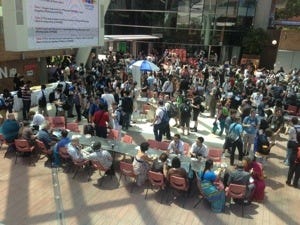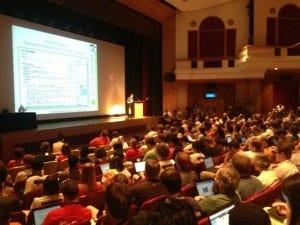A Few Thoughts on Wikimania 2013
Last year, I posted a recap of each day at Wikimania 2012. That's far more output than you'll usually see around here, and a big reason was that last year's event occurred in the city where I live, Washington, DC. This year it's more than two weeks since Wikimania 2013 closed, and I'm just going to share a few thoughts and photos and call it good. This is also partly a function of where the event was held.
This year, it was Hong Kong, a city I once lived in long ago, and had not visited since the 1990s, and I brought with me a friend who was there for Hong Kong, and not so much for the conference. So I mostly hit morning sessions on the first and final day, and tried to see as many people as I could (and didn't always succeed in that).

I attended the first morning session, where Jimmy Wales gave the most anticipated of the opening remarks. And the most interesting thing he said actually related not at all to Wikipedia, but to Edward Snowden, the former NSA contractor turned leaker of a great, great many government secrets, now on permanent vacation in Moscow. Anyone who follows Wales' politics probably had an inkling that Wales was supportive—but he gave him a bigger endorsement than that:
"Love him or hate him—I think he's awesome—he's done something very important."
He went on to say the same in a WSJ interview later that day. What did he say about Wikipedia? Well, it's pretty good! Eight language editions now have more than a million articles, with Italian, Russian, Spanish and even Swedish joining the club. An asteroid was named for Wikipedia, too.
That's nice, but nothing groundbreaking. Wikipedia will continue to extend its reach, improve its software, refine its processes, and find new ways to engage editors—but it doesn't seem to excite him anymore, and after a decade-plus of involvement, who can blame him? The month before Wikimania, Wales took a one-month break from the Internet, asking Wikipedians to avoid asking him questions via his Wikipedia user account until he returned.
The biggest wiki-related news he made also had something to do with Snowden, or at least was inspired by it: Wales called for a new "hybrid model" of journalism, encouraging collaboration between professionals and amateurs. It sounds interesting, maybe, but he didn't have an actual model in mind: he called on the Wikipedia and Wikimedia community to help him think it up. I guess we'll see. Some raised the question of what will contributors to the Wikimedia Foundation's Wikinews project think of it, but the question kind of answers itself: Wikinews has never been a success, and is kept alive only by a few die-hards. An attempt was made to kill the project earlier this year, though it didn't succeed. So maybe this will become that. Or maybe we'll never hear about it again.

Of the panel sessions I attended, there were two in a row, by a French Wikipedia editor, about a subject of great interest to me, personally and professionally. The first was about Wikipedia's relationship to companies, and whether they can have a beneficial impact on Wikipedia. The second was whether there can be a framework for paid editors to contribute to Wikipedia. As I mention here from time to time, for several years now I've done this kind of work on a consulting basis. It can work out very well, but it's not at all easy.
Although companies can successfully work with the community to improve articles of interest, it's not widely discussed, except when someone gets caught trying to go about it the wrong way. These are sensitive topics in the Wikimedia community, which prizes its volunteer ethic, and commitment to neutrality, not to mention a suspicion of outside organizations, for-profit or non-profit, who might try to use Wikipedia to boost its own messaging.
I was a little surprised that the discussion didn't arouse much emotion, or raised voices—maybe once toward the end of the end of the period—but the real reason, I think, is just because the presenter didn't have a strong solution to propose—just a "framework"—and as someone who is very familiar with the arguments for and against different proposals around paid editing, I knew it wasn't going anywhere.
The fact that Jimmy Wales' so-called "bright line" rule (which advises "paid advocates" to stick to discussion areas of Wikipedia, is not a formal rule anyway) was not raised at all surprised me. I almost raised my hand and brought it up, and then decided against it. A wide range of views were shared, many of them more supportive of some cooperation with outside companies and organizations than I would have expected, but nothing here was going to be solved.

For more photos and commentary, I tweeted the conference at my Twitter account associated with this address, @thewikipedian. Next year's conference is in London. How will I cover that one? I am curious to find that out myself.


